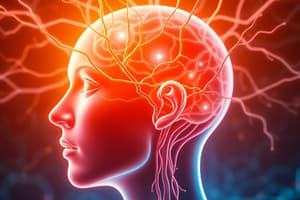Podcast
Questions and Answers
What is the primary function of the dorsal part of the mid-insula?
What is the primary function of the dorsal part of the mid-insula?
What is the term for the combination of gustatory and olfactory properties that describe the sensation of a food?
What is the term for the combination of gustatory and olfactory properties that describe the sensation of a food?
What type of neurons respond to both taste and smell stimuli?
What type of neurons respond to both taste and smell stimuli?
Where is the insular cortex located in the brain?
Where is the insular cortex located in the brain?
Signup and view all the answers
What is the role of the thalamus in the taste pathway?
What is the role of the thalamus in the taste pathway?
Signup and view all the answers
What is the term for the sensation that results from the combination of taste and other sensory inputs, such as burning from hot peppers?
What is the term for the sensation that results from the combination of taste and other sensory inputs, such as burning from hot peppers?
Signup and view all the answers
Where does higher-order processing of olfactory information occur?
Where does higher-order processing of olfactory information occur?
Signup and view all the answers
What is a common observation in individuals with PTSD?
What is a common observation in individuals with PTSD?
Signup and view all the answers
What is affected in individuals with PTSD, leading to difficulties in encoding and retrieving olfactory memories?
What is affected in individuals with PTSD, leading to difficulties in encoding and retrieving olfactory memories?
Signup and view all the answers
What contributes to difficulties in regulating emotional responses to olfactory cues in individuals with anxiety disorders?
What contributes to difficulties in regulating emotional responses to olfactory cues in individuals with anxiety disorders?
Signup and view all the answers
What is the reason why crushing a solid spice makes it smell stronger?
What is the reason why crushing a solid spice makes it smell stronger?
Signup and view all the answers
What is necessary for smell to occur?
What is necessary for smell to occur?
Signup and view all the answers
What happens to odorants emitted by food when we chew and swallow?
What happens to odorants emitted by food when we chew and swallow?
Signup and view all the answers
What influences the pleasantness of food?
What influences the pleasantness of food?
Signup and view all the answers
Which brain regions are involved in appetite control?
Which brain regions are involved in appetite control?
Signup and view all the answers
Why do foods with complex textures tend to leave us feeling fuller?
Why do foods with complex textures tend to leave us feeling fuller?
Signup and view all the answers
What is the relationship between energy expenditure and appetite?
What is the relationship between energy expenditure and appetite?
Signup and view all the answers
What happens to appetite following a meal?
What happens to appetite following a meal?
Signup and view all the answers
Study Notes
Neural Impulses and Taste Pathways
- The medulla, solitary nucleus, and thalamus are involved in taste pathways.
- The gustatory cortex, located between the frontal and temporal lobes, receives taste information from the thalamus.
Insular Cortex and Taste
- The insular cortex is located behind the frontal and temporal cortexes and receives input from all over the brain regarding bodily sensations.
- The dorsal (top) part of the mid-insula is where taste information from the thalamus is represented in the brain.
Taste and Smell
- The orbitofrontal cortex (OFC) integrates taste and smell information, as well as other sensations, to create the sensation of flavor.
- Bimodal neurons in the OFC respond to both taste and smell, as well as taste and vision.
- The firing of these neurons is affected by the level of hunger, and foods can taste different when hungry.
Smell, Memory, and Emotions
- The prefrontal cortex is involved in higher-order processing of olfactory information, integrating sensory and emotional information, and interpreting emotional significance.
- The amygdala is involved in emotional responses to smells, and individuals with PTSD may exhibit hyperactivity in this area.
- The hippocampus is involved in encoding and retrieving olfactory memories, and dysfunction in this area can affect emotional responses to olfactory cues.
Flavor and Retronasal Olfaction
- Retronasal olfaction occurs when odorants from food are forced up behind the palate and enter the nose from the back, integrating with taste information to create flavor.
- Flavor provides information about the food being eaten.
Appetite and Food Consumption
- Appetite is influenced by expectations, such as the presentation of food or the price of a meal.
- Key areas involved in appetite control include the amygdala, hippocampus, insula, striatum, and orbitofrontal cortex (OFC).
- Texture affects appetite, with complex textures creating more neural responses and leading to feelings of fullness.
Studying That Suits You
Use AI to generate personalized quizzes and flashcards to suit your learning preferences.
Description
Learn about the neural impulses, brain regions, and pathways involved in sensation and perception, including the role of the medulla, thalamus, gustatory cortex, and insular cortex. Test your knowledge of the human body and chemical senses.




